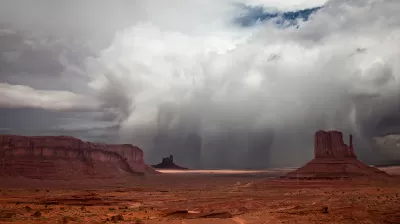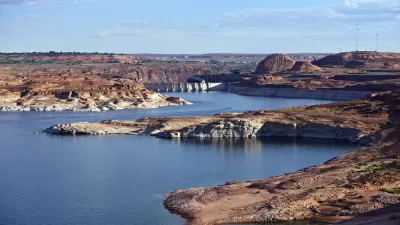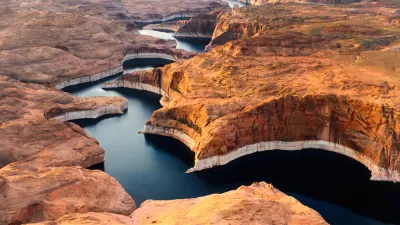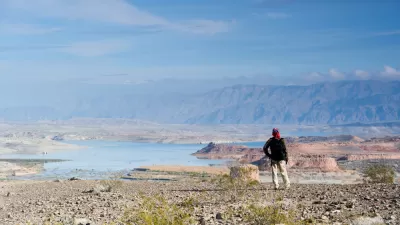The megadrought continues, with contingency plans differing by location.

As recently as 2019, rain was falling in abundance and rivers were running high, but no one should be surprised that drought is again gripping the West.
"California is suffering from severe drought again," reports Peter Gleick. "This winter produced water conditions far below normal for the second year in a row, the eighth year in the last 10, the 14th year in the last 20. Los Angeles has had 39% of normal precipitation; San Diego, only 30%; San Francisco, 37%; Sacramento, less than 40%."
It's only been a few years since the last drought crisis in California—then Gov. Jerry Brown declared a drought emergency in 2014, when the state's reservoirs were at roughly the same level they are at now. "The California Department of Water Resources announced that it expected to deliver only 5% of requested supplies to municipal and agricultural users on the State Water Project, down from the initial allocation of 10% announced in December," reports Gleick. Still, "Gov. Gavin Newsom has not declared a statewide drought emergency, and his website says nothing about drought."
Along the Colorado River and its tributaries, a Drought Contingency Plan kicked into effect in January for states located in the watershed's upper Basin—Colorado, Utah, New Mexico, and Wyoming. It was the first time since the DCP was adopted in 2019 that drought conditions triggered water conservation efforts on that section of the watershed, but it certainly won't be the last. Research published in April 2020 described the ongoing drought along the Colorado River watershed, dating back to 2000, as a once-in-a-millennium megadrought, and droughts are only expected to get worse.
Another article by Drew Kann focuses on the current status of the Colorado River, especially water levels at Lake Mead and Lake Powell. The bad news is of historic proportion: "The projections released by the US Bureau of Reclamation show that Lake Mead -- the largest reservoir in the country and a vital water supply to millions across the Southwest -- could fall later this year to its lowest levels since it was filled in the 1930s." While Lake Mead sits at 39 percent capacity, Lake Powell, the second largest reservoir on the river, is currently holding 36 percent of its full capacity.
Kann's coverage also provides details of next steps in the Drought Contingency Plan for the lower basin, which could slash water supply for Arizona, Nevada, and Mexico. Arizona's water supply from the Central Arizona Project would be cut by a third by 2022 if conditions don't improve.

Planetizen Federal Action Tracker
A weekly monitor of how Trump’s orders and actions are impacting planners and planning in America.

DARTSpace Platform Streamlines Dallas TOD Application Process
The Dallas transit agency hopes a shorter permitting timeline will boost transit-oriented development around rail stations.

Congressman Proposes Bill to Rename DC Metro “Trump Train”
The Make Autorail Great Again Act would withhold federal funding to the system until the Washington Metropolitan Area Transit Authority (WMATA), rebrands as the Washington Metropolitan Authority for Greater Access (WMAGA).

Supreme Court Ruling in Pipeline Case Guts Federal Environmental Law
The decision limits the scope of a federal law that mandates extensive environmental impact reviews of energy, infrastructure, and transportation projects.

Texas State Bills to Defund Dallas Transit Die
DART would have seen a 30% service cut, $230M annual losses had the bills survived.

Bikeshare for the Win: Team Pedals to London Cricket Match, Beats Rivals Stuck in Traffic
While their opponents sat in gridlock, England's national cricket team hopped Lime bikes, riding to a 3-0 victory.
Urban Design for Planners 1: Software Tools
This six-course series explores essential urban design concepts using open source software and equips planners with the tools they need to participate fully in the urban design process.
Planning for Universal Design
Learn the tools for implementing Universal Design in planning regulations.
Roanoke Valley-Alleghany Regional Commission
City of Mt Shasta
City of Camden Redevelopment Agency
City of Astoria
Transportation Research & Education Center (TREC) at Portland State University
US High Speed Rail Association
City of Camden Redevelopment Agency
Municipality of Princeton (NJ)





























